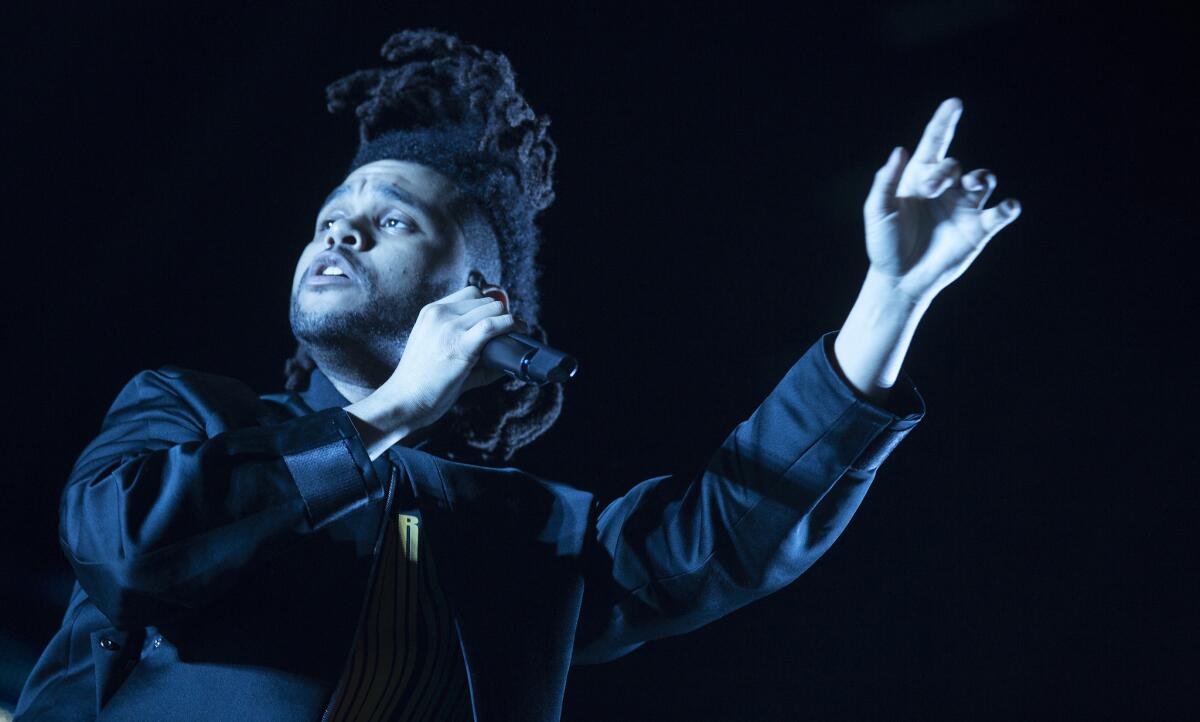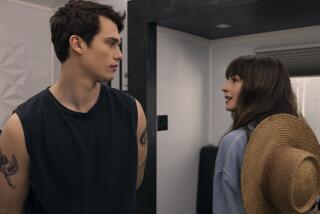Coachella Festivalâs epic factor plays out in the music, good and bad

The Weeknd at the Coachella Valley Music and Arts Festival in Indio on April 11.
Reporting from Indio, Calif. â Abel Tesfaye, the Canadian R&B singer known as the Weeknd, is not a man given to exaggerated cheer. In his dark but sensual music, which has exploded in popularity since he released a series of albums on the Internet in 2011, he describes a world of romantic dysfunction where no one ever has anything positive to say.
So when Tesfaye concluded his performance at the annual Coachella Valley Music and Arts Festival by declaring that he was having the greatest night of his life, you were inclined to take him seriously. Even if Saturday was only second- or third-best, that says an awful lot about Coachella, whose first weekend ran Friday through Sunday at the Empire Polo Club; it will repeat this weekend with the same sprawling lineup (including headliners AC/DC, Jack White and Drake).
FULL COVERAGE: Coachella 2015
Long considered the most prestigious music festival in America â partly because it kicks off the summer season and partly because it attracts a crowd peppered with celebrities â Coachella has metastasized over the decade and a half since its founding into a closely watched cultural event, one that helps set agendas, not only in music but also in media, branding and style. (The fast-fashion retailer H&M recently introduced a collection based on the willowy look widely adopted here.)
Itâs become a place that compels everyone, artists and attendees alike, to think big.
You could detect the weight of that perceived importance all weekend. In some ways, that heightened the experience. In others, it dampened it.
Headlining the main stage Saturday night, White embraced the pressure. His thrilling, hip-hop-inflected set, which he dedicated to âtransgender people,â seemed designed to upset his reputation as a roots-music fuddy-duddy, with explosive renditions of songs from his solo albums and by the White Stripes and the Raconteurs.
âThe gold rush is over,â he announced at one point, an apparent reference to the dramatic California landscape. âThis is the new world, is it not?â
Azealia Banks had society on her mind too, setting aside her weakness for trash talk to rap about the intersection of sex and celebrity as she danced in front of a giant, digitally undulating American flag.
Other artists pondered more personal themes in similarly epic terms. Backed by a muscular three-piece band, the Weeknd blew up his bad-love songs to fit Coachellaâs dimensions; his vocals, more assured than heâd ever sounded, floated like a poisonous cloud over the packed polo field.
Swedish singer Lykke Li was equally potent, singing about breaking hearts in one of the festivalâs smaller tents. Wrapped in filmy black fabric, she brought serious dead-flower power to an event known for its smiley, neo-hippie vibe.
Bad Religion, the veteran Los Angeles punk band, used the platform to provoke instead, flashing giant crosses with bars through them on video screens between songs. Welsh synth-pop act Marina and the Diamonds went cartoon-playful with enormous prop fruits. And in the Sahara tent, the festivalâs cavernous dance music space, DJs like Porter Robinson and DJ Snake supersized their beats and accompanying visuals for maximum impact.
Some artists seemed overwhelmed by the demand to make Coachella count. Chet Faker, an Australian electro-soul crooner, got lost inside his grooves, too drowsy to make an impact. And Hozier, looking to bring some edge to his middle-of-the-road profile, brought out Este Haim (of L.A.âs Coachella-approved sister trio Haim) for a cameo that made him seem only more square.
Inevitably, several acts were (or pretended to be) less impressed by Coachellaâs self-reinforcing grandeur. AC/DC and Steely Dan â two classic-rock acts booked in part to expand the festivalâs reach among older fans willing to pay for pricey VIP packages â played deeply satisfying versions of shows theyâve each been playing in less glamorous venues for years.
âI hope you guys like rock ânâ roll,â said AC/DCâs Brian Johnson, âbecause thatâs all we do.â
He wasnât apologizing, of course. One of the few people here who needed Coachella less than Coachella needed him, he was saying, âYouâre welcome.â
More to Read
The biggest entertainment stories
Get our big stories about Hollywood, film, television, music, arts, culture and more right in your inbox as soon as they publish.
You may occasionally receive promotional content from the Los Angeles Times.











